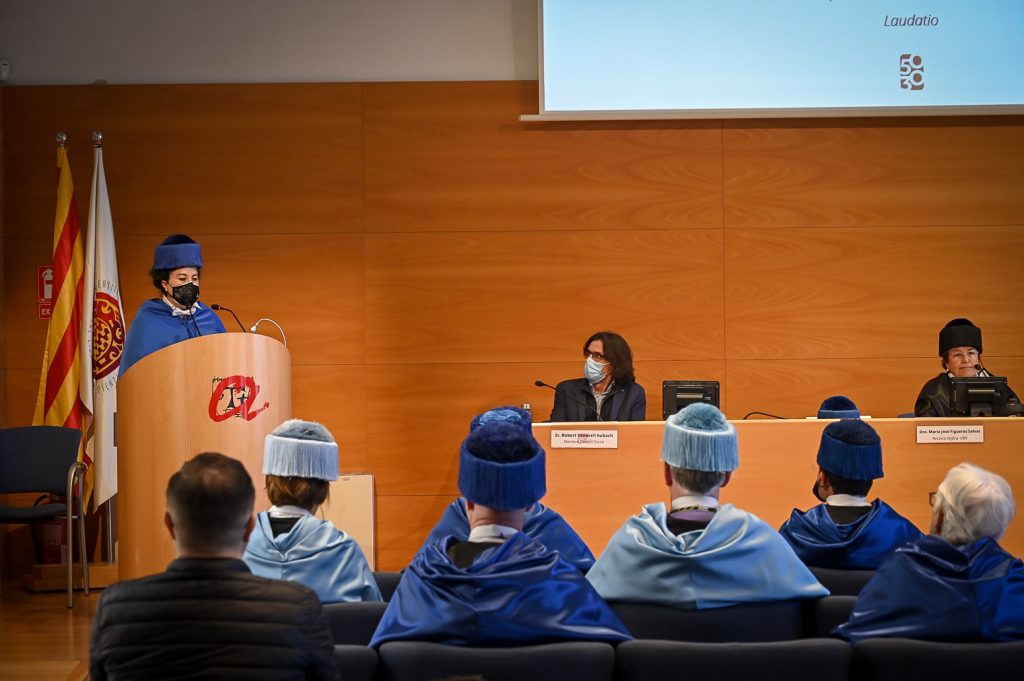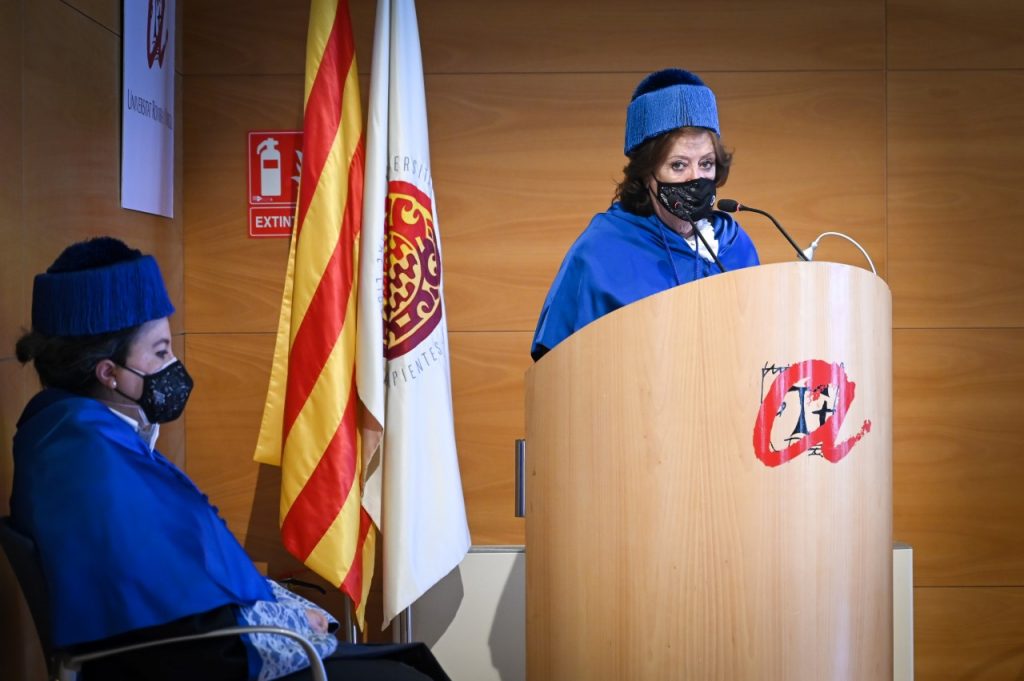22/04/2022
María Vallet, pioneer in the use of bioceramic materials for bone tissue regeneration, is awarded an honorary degree by the URV
She also suggested introducing pharmaceuticals into the pores of mesoporous silica materials to achieve the controlled release of pharmaceuticals, which would open up a new therapeutic and research field. The Faculty of Chemistry proposed that as professor of Inorganic Chemistry at the UCM she should be awarded a doctorate by the URV on the occasion of the 50th anniversary of the degree in Chemistry in Tarragona

She also suggested introducing pharmaceuticals into the pores of mesoporous silica materials to achieve the controlled release of pharmaceuticals, which would open up a new therapeutic and research field. The Faculty of Chemistry proposed that as professor of Inorganic Chemistry at the UCM she should be awarded a doctorate by the URV on the occasion of the 50th anniversary of the degree in Chemistry in Tarragona
María Vallet is a pioneering scientist in the field of chemistry applied to medicine. And she has made a double contribution: first, she managed to regenerate bone tissues by using inorganic mesoporous ceramic materials and, since 2001, she opened up a new field of research based on using these same materials for the transport and release of drugs in the treatment of infections, cancers, bone diseases and osteoporosis. Applications to patients in this second field will still have to wait a few years, but the qualitative leap will be significant.
Yolanda Cesteros, dean of the Faculty of Chemistry of the URV, sponsored Maria Vallet, professor of Inorganic Chemistry at the Faculty of Pharmacy of the Complutense University of Madrid, and proposed that she be awarded an honorary degree on the occasion of the 50th anniversary of the degree in Chemistry in Tarragona. In her encomium, Cesteros expressed the importance of Maria Vallet’s leadership in paving the way to the integration of disciplines such as chemistry, biology, pharmacology, engineering, medicine and physics. The result is a turning point in the search for solutions for human health.

Vallet, a chemist by training, was appointed professor in Inorganic Chemistry at the Faculty of Pharmacy of the UCM in 1990: “This was a turning point in my research looking for health applications,” she explained. “For every problem, there is a solution. Not everything is useful, but if we use our scientific knowledge and have necessary actors for each function, we will achieve the desired results”. This premise, which Vallet described during her speech of acceptance, has guided her intellectual work, the objective of which is for “research to reach the bedside of the sick”. Bringing knowledge to clinical practice, moreover, “involves considerable coordination between very different professional profiles”.
And so he began research into the use of mesoporous inorganic ceramic materials in the field of regenerative biomedicine, more specifically in the regeneration of bone tissues. The idea is to manufacture tissues similar to the patient’s original but damaged tissues and then replace them, with the help of biomaterials covered with a layer of cells that grow until they colonize the complete structure and become a functional tissue or organ.
Inorganic nanoparticles to transport pharmaceuticals
But in the early 2000s, she had the idea of using these materials in combination with nanomedicine to make a breakthrough: “Some of the most promising drugs in the fight against cancer work well when interacting with cells in cell culture assays, but they are ineffective in the organism, since they are degraded by enzymes in a matter of minutes.”
Therefore, Vallet believes that the solution lies in using inorganic nanoparticles, such as mesoporous silica, because their mechanical resistance, chemical stability, biocompatibility and resistance to microbial attack make them good candidates for bearing pharmaceuticals that need to be administered to patients to treat specific areas. The first article describing this approach was published in 2001 and opened a new therapeutic window and a new field of research. In fact, the European Research Council granted funding for a proof of concept in 2015 and an advanced grant the following year.

Vallet said she was happy to contribute to improving people’s health and mentioned “the social value” and “the economic value” of scientific breakthroughs in this field because of the high added value of innovation and knowledge: “For example, in the case of substitutes for bones and teeth, products such as calcium salts are very cheap and abundant.” The rector, María José Figueras, highlighted the importance of the figure of María Vallet, the resilience that has allowed her to develop as a scientist and pioneer in biomedicine, and her strong defence of science as a means to generate social progress and peace in the world (she participated in the Rectoral Committee of the NATO Science for Peace Program between 1999 and 2005). Figueras highlighted the fact that Vallet has been added to the URV’s list of honorary degree holders.
As a sign that the URV has welcomed a new honorary doctor into its scientific community, the rector gave Vallet the degree that certifies the distinction, the medal and the biretta, as well as the other items that accompany the distinction: the book of science and wisdom, the ring symbolising the privilege of sealing the dictates of science and the profession, and the white gloves.
